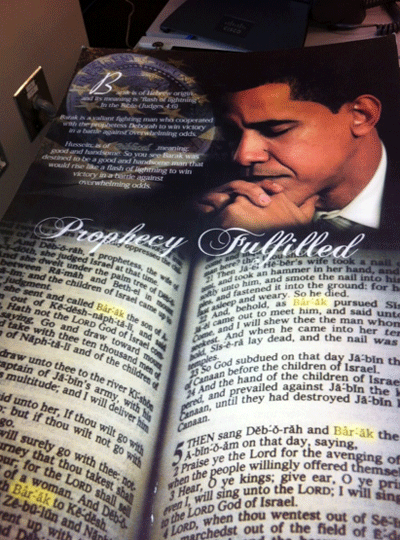obama has not healed any one
obama has not healed the blind
obama did not raise any one from the dead
you people follow the aint christ
Prophecy Fulfilled"

Street vendors across downtown Charlotte are selling posters and artwork depicting President Obama as Jesus Christ ...One poster features an image of the president in prayer with the headline, “Prophecy Fulfilled.”Source: Artwork likens Obama to Jesus Todd Stearnes. Fox News and Commentary. (9/4/12).
“Barak is of Hebrew origin and its meaning is ‘flash of lightning,” the poster notes, referencing a passage in in the Old Testament book of Judges.
Hussein, they allege, is a Biblical word meaning “good and handsome.”
“So you see, Barak was destined to be a good and handsome man that would rise like a flash of lightning to win victory in a battle against overwhelming odds,” the poster read.
The posters were being sold outside security zones at the Democratic National Convention. The posters are not sanctioned by the DNC.
(Matthew 11:2-6; Luke 7:18-23)
Eventually news of Jesus’ raising of the widow’s son reached the ears of John, who was in prison. John sent his disciples to Jesus to ask, “Are you the Coming One, or do we look for another?”It seems to be a strange question coming from the man who prepared the way for Christ and declared him to be the Messiah at his baptism. Yet, we must remember that John was a man, like all the other prophets before him. Other prophets had their moments of doubt. Moses had to be convinced to go and free the Israelites (Exodus 4:1-17). Gideon asked for two miracles before he lead God’s people to war (Judges 6:36-40). Elijah gave up after Jezebel threatened his life (I Kings 19:1-10). Jeremiah cursed the day he was born (Jeremiah 20:14-18). Remember that John has been in prison for quite a while now. Perhaps he thought, as did so many Jews, that Jesus would lead Israel in triumph against the Romans. Yet in all this time, Jesus hasn’t declared himself, nor has there been any apparent move to re-establish the kingdom of Israel. And for John, there has been no rescue. Is it a wonder that John began to doubt himself?
Jesus didn’t answer John’s disciples directly. Instead during that very hour that they asked, he performed numerous miracles before the disciples of John. Afterwards he told them to return to John and tell them what they witnessed. His reply back to John echoes the words of Isaiah 35:5-6 and Isaiah 61:1, but the hidden message is found in the verse before. “Say to those who are fearful-hearted, "Be strong, do not fear! Behold, your God will come with vengeance, with the recompense of God; He will come and save you"” (Isaiah 35:4). Jesus was telling John to take courage. Jesus warns John not to fall away because Jesus was not meeting John’s personal expectations.
Isaiah 61:1
New International Version (NIV)
The Year of the Lord’s Favor
61 The Spirit of the Sovereign Lord is on me,
because the Lord has anointed me
to proclaim good news to the poor.
He has sent me to bind up the brokenhearted,
to proclaim freedom for the captives
and release from darkness for the prisoners,[a]
because the Lord has anointed me
to proclaim good news to the poor.
He has sent me to bind up the brokenhearted,
to proclaim freedom for the captives
and release from darkness for the prisoners,[a]
Footnotes:
- Isaiah 61:1 Hebrew; Septuagint the blind
Matthew 3:16-17 (King James Version)
Matthew 3:16-17
King James Version (KJV)
16 And
Jesus, when he was baptized, went up straightway out of the water: and,
lo, the heavens were opened unto him, and he saw the Spirit of God
descending like a dove, and lighting upon him:
17 And lo a voice from heaven, saying, This is my beloved Son, in whom I am well pleased.
17 And lo a voice from heaven, saying, This is my beloved Son, in whom I am well pleased.
|
||||||||||||
No comments:
Post a Comment